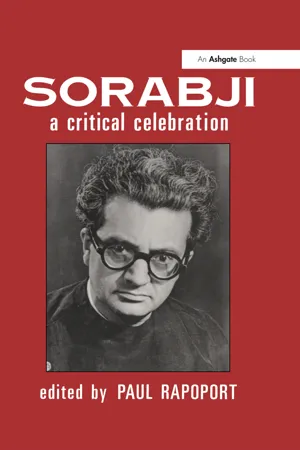![]()
Part I
Discovery
![]()
1
Why Sorabji?
Paul Rapoport
Paul Rapoport (b. 1948, Toronto) received a Bachelor’s degree in linguistics and music from the University of Michigan and Master’s and Doctoral degrees in musicology from the University of Illinois. He has written books on Vagn Holmboe and Havergal Brian, as well as one dealing with six composers living in Northern Europe, including Sorabji. He has also written many articles on 20th-century music, including reviews in Fanfare since 1977. As a composer he has a particular interest in microtonality. Currently he is on the faculty of McMaster University in Hamilton, Ontario.
He began studying Sorabji’s music and prose in 1971, first corresponded with him in 1974, and visited him four times from 1976 to 1980.
In the following, I.P. stands for Interested Person, one experienced in listening to and reading about music. Ed. is the editor of this book.
I.P.: Who is Sorabji?
Ed.: There’s a simple answer: a composer of the 20th century who wrote a lot of fascinating and unusual music, especially piano music, which few people are aware of.
I.P.: What nationality is he? His name sounds Indian.
Ed.: It’s a Parsi name. Many Parsis settled in India after they fled from Persia over a thousand years ago. But in order to find out why Sorabji did not consider himself an Indian, indeed became enraged at being called one, I’ll ask you to read Chapter 2 of this book. He was born and lived in England, by the way, but he refused equally to be labelled English.
I.P.: That sounds rather strange. But what I really want to know is whether I’d like his music. I haven’t heard any of it.
Ed.: I don’t know whether you’d like it, as I don’t know your attitudes towards music and listening to it, or other aspects of your experiences. Even then, predicting likes and dislikes is nearly impossible. Understanding is perhaps a more worthy objective. I think that nearly anyone who has a positive curiosity about music of this century may understand Sorabji’s music. But he also has his roots in many composers of earlier times, including some who were only slightly older. Do you have any interest in Skryabin, Debussy, Reger, Busoni, Liszt, Bach, early Schoenberg?
I.P.: Yes … I like some of them. Are those Sorabji’s influences? Does he sound at all like them? I can’t imagine putting all those together.
Ed.: Neither can I, but Sorabji certainly was attracted to some of their music and attitudes. For example, Liszt’s virtuosity, Debussy’s love of sound colour, Skryabin’s mystical extremism, Bach’s counterpoint …
I.P.: I get the idea, but the generalities help only a little. Supposing one were curious, what would be the best place to start? There must be several recordings, to which any newcomer would appreciate some guidance.
Ed.: There have been eight recordings, excluding reissues, plus one that was noncommercial. They’re listed in Appendix 2 — and are certainly worth hearing, although some are recommendable only in part. However: a mere dozen years ago there were no recordings at all. The first was issued when Sorabji was nearly 90.
I.P.: Why so little, especially during his lifetime? How can this composer be of any significance if almost no one records his music?
Ed.: A partial answer to your first question lies in the music’s extreme difficulty. More explanations are found in Chapters 2 and 3 of this book. As for the second, why are recordings, or performances for that matter, necessary for significance of a composer’s music?
I.P.: Surely you’re not serious. It’s obviously the best music which enters the Western tradition, and it can’t do that without being heard, and heard by a lot of people. If a composer’s music is good, it will get around. If it isn’t heard, in a sense it doesn’t even exist. It certainly can’t be significant. And these days any compose...
